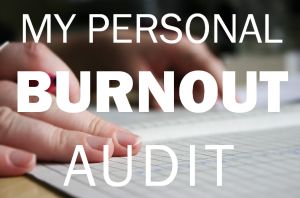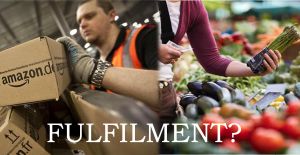Archive for “Originally posted on Transition Network” category
Showing results 41 - 45 of 383 for the category: Originally posted on Transition Network.
10 Mar 2016
Our theme for the next 2 months is ‘International’. With the Transition movement now being active in over 50 countries, it feels like a good time to pause and reflect on how that is working, what it looks like, and the many wonderful things, and the challenges, that arise from that. To kick off our theme, I want to offer some reflections on the forthcoming EU referendum here in the UK (The Guardian have done a great guide to what it’s all about here). During this theme, we will look at this from a variety of perspectives, both within the UK and outside. I want to start with some of my own reflections, and how the current debates, and the issues they raise, impact on me.
It is important to be clear that what follows is not an official Transition movement, or Transition Network position on the in/out EU referendum. Within the movement there will be a wide variety of views, and many who will disagree with what I am about to write. These are just my own personal thoughts. We will try very hard to tease out issues and perspectives that make it relevant wherever you are in the world, rather than being just some parochial British storm in a tea cup. If you feel moved or inspired (on enraged!) to share your thoughts, we’d love to hear from you.
Tossed adrift on the seas of Bremain/Brexit
So, for me, with the Referendum looming in June, I feel like the bewildered child of argumentative parents. I feel as though one parent (Parent One) is hugely overbearing, thinks they know what’s best for me, takes little consideration of my feelings, has addiction issues, and wants to take my life in a direction that deeply alarms me … think something along the lines of Cruella De Vil.
The other parent (Parent Two) is also somewhat self-obsessed, has a ruthless streak, is used to living the high life, but has a slightly better track record in terms of caring about the good things in my life. The dilemma I am facing is whether an upcoming custody case, whose decision will be almost entirely out of my hands, is going to award Parent One sole custody, or whether custody will be jointly awarded. I find myself longing desperately for joint custody.
Please don’t leave me alone with George Osborne…
Let me expand on this odd custody case analogy a little. Parent One is the UK government. Given that historically any non-Conservative, or left-leaning administrations needed most or all of the 59 Scottish seats to make up a majority government, and in the last election Scotland voted almost entirely for the pro-independence Scottish National Party, it feels increasingly likely that we may have this current Conservative, neo-liberal, austerity-fixated administration in office for many years to come.
We hear much talk from the Brexit camp (those who want the UK to leave the EU, and who can be found across the political spectrum, indeed the Conservatives are split on the issue) that this is about the UK having more control over its sovereignty, but actually, the UK government is already doing a great job of taking away power from people in a number of ways. For example, the changes to the planning system that overrides local opinion, or what’s happening under the guise of ‘devolution’, an approach which actually puts more power into the hands of local business elites than local people (see our interview with Bob Hudson for more). Democracy is becoming more and more meaningless here, with more and more power residing with unelected business elites under the obsessive belief that “growth” is the most important thing.
The UK government’s current approach is all about freedom of movement for goods and money, but minimising the freedom of movement for the victims of our appalling foreign policy gaffes of the last 20 years. Their focus is on the rights of capital, not of people. They put the wellbeing of the fossil fuel industry before the creation of a renewable energy infrastructure. The other political parties have yet to be as vociferous on the issue as the Conservatives, but hopefully will be increasingly so.
Parent Two: the EU and its democracy deficit
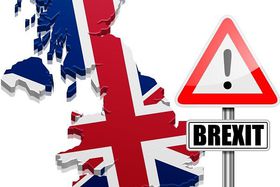 Parent Two (the EU) isn’t perfect either. As Tim Lang and Victoria Schoen put it their excellent briefing paper on the impacts of a Brexit on the food sector, the EU “has been a bulwark against powerful forces, but it has also been subverted by them”. Parent Two spends money like it’s going out of fashion, is very hard to communicate with, and also has a serious democracy deficit.
Parent Two (the EU) isn’t perfect either. As Tim Lang and Victoria Schoen put it their excellent briefing paper on the impacts of a Brexit on the food sector, the EU “has been a bulwark against powerful forces, but it has also been subverted by them”. Parent Two spends money like it’s going out of fashion, is very hard to communicate with, and also has a serious democracy deficit.
Yanis Varoufakis, former Greek Finance Minister, has referred to the European Union, in particular the European Commission and the European Central Bank, as “democracy-free zones by design”. As he points out, the EU was originally set up as a cartel of heavy industry, as the European Community of Coal and Steel, later on adding farming to its focus. “It was never meant to be the beginning of a Republic of a democracy where “we, the people of Europe”, rule the roost”, he adds.
As the Finance Minister of a democratically-elected radical anti-austerity government in Greece, his account of meetings with European finance ministers is illuminating. He recalls being told by one German Finance Minister, “elections cannot be allowed to change established economic policy”. He continues, “the Troika asserted quite clearly that democracy cannot be allowed to change anything”.
The skeletons in the EU’s closet
Much of the power in the EU lies with the unelected European Commission, rather than in the European Parliament, which Varoufakis calls “a cruel joke”. “It doesn’t function as a proper Parliament” he states. Among other things, the European Commission and Central Bank treated Greece appallingly following the financial collapse of 2008.
The Greeks were (and still are) subjected to what economist James Galbraith called a form of “collective punishment”. It was an approach that, between 2008 and 2011 led to a 40% rise in infant mortality and a 47% rise in unmet healthcare needs, as well as an explosion of HIV cases and suicides. The ‘Recovery Plan’ for Greece insisted that spending on public health be kept below 6% of GDP, while Germany, one of the key EU states driving for the plan, rightly celebrates committing more than 10% on its own budgets to public health. And when the bailouts arrived, with their many onerous strings attached, where did they go? As David Stuckler and Sanjay Basu note in ‘The Body Economic’:
“The New York Times investigated and found that the IMF and European Central Bank were funnelling money through Greece and straight back to the UK, France, the United States, and Germany, to creditors there who had contributed to Greece’s disastrous bubble. Greece’s bailout was using public funds not to help Greece, but to rescue the poorly invested private money of the world’s banking elite”.
And we don’t even have space in this article to mention TTIP, the Transatlantic Trade and Investment Partnership (which would make much of what Transition aspires to do far more difficult), although I will say that, as Caroline Lucas MP points out, overturning TTIP is best done from within the EU. David Cameron is its loudest cheerleader, and already 3 million of our European neighbours have signed a petition opposing it.
Standing up for democracy
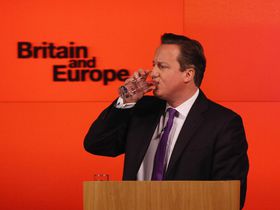 At the heart of the problems with both of my squabbling parents is that we are being robbed of democracy at all scales: internationally; nationally; regionally and locally: as is happening in many places around the world.
At the heart of the problems with both of my squabbling parents is that we are being robbed of democracy at all scales: internationally; nationally; regionally and locally: as is happening in many places around the world.
For Varoufakis, “we have, at most, one decade to change Europe”, and key to that is to democratise the EU. In the same way that we need to fight for meaningful democracy in the UK, oppose unelected, un-transparent but increasingly influential bodies like Local Enterprise Partnerships, and the removal of democracy being carried out under the cover of ‘devolution’, we must also do the same within the EU.
Interestingly, there has been, over recent years, significant interest within the EU towards Transition, a growing awareness that it last lost connection with communities and people on the ground, and that it can learn much from movements like Transition. One manifestation of this was Transition Network winning the European Economic and Social Committee’s prize in 2012. There is a lot of interest in what can be learnt from Transition.
Varoufakis has started the ‘Democracy in Europe’ movement (see their Manifesto here), to directly tackle the democracy deficit within the EU, especially the Commission, which he describes as “not answerable to any parliament”. “Dreaming of a united, democratised Europe is our only weapon against a divided, authoritarian, potentially Dark Europe” he recently wrote. We need to stick around and play an active role in this.
Why I lean towards ‘Bremain’
But in spite of all the negatives about the EU, Parent Two has done more good things for the issues I care most about (the environment, social justice, human rights, workers rights, and, as Lang and Schoen argue, for food and farming). I see more evidence that they care, that they hold power to account. The UK’s seas are cleaner, our air more breathable, our workers better protected, and so on, because of them.
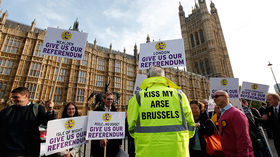 Without their influence, with no second parent to turn to, I fear deeply for Parent Two no longer having a role to play in my life, no longer being able to act as a restraining influence on Parent One. Among other things, as Lang and Schoen point out, a Brexit would lead to “unravelling 43 years of co-negotiated food legislation and exchange”.
Without their influence, with no second parent to turn to, I fear deeply for Parent Two no longer having a role to play in my life, no longer being able to act as a restraining influence on Parent One. Among other things, as Lang and Schoen point out, a Brexit would lead to “unravelling 43 years of co-negotiated food legislation and exchange”.
I would have no right of appeal, no second opinion, the lunatics would truly have taken over the asylum. It was Parent Two, after all, who called for a Robin Hood Tax, and for an EU-wide cap on bankers’ bonuses, and Parent One who sunk both proposals.
It’s a future too bleak and horrible to contemplate, and, as the window to address climate change rapidly contracts, we would be placing our future in the hands of an administration for whom it is an issue to be brushed beneath the carpet whenever possible. Yes, of course we must not be passive, must come together to resist where we can, and must redouble our endeavours to model new approaches, different models, community investment and so on. But we must also argue the case for joint parenting as being the far preferable of the two options.
A future of true devolution, of local empowerment, of resilient, thriving, happy local low carbon economies, will be far more possible if we ‘Bremain’. That’s what I think anyway. What about you?
For those of you who follow Transition Network on social media, we will be posting the Best of the Press, from both sides, over the next couple of months. If you come across anything particularly good that you feel needs sharing, do get in touch.
Read more»
9 Mar 2016
In which I visit an extraordinary venue in Paris and find myself painted on a window.
I was in Paris yesterday to speak at a place called La Recyclerie, at the invitation of UpCafe, an organisation that runs a series of talks about social innovation and sustainability. The event had sold out several weeks ago, due, in part, to the ‘Demain effect’, as the number of people who have now seen the film passes 800,000. La Recyclerie is an amazing place, based in an old train station that closed down decades ago and has been renovated and restored into an amazing demonstration of permaculture/Transition/recycling in the heart of Paris.
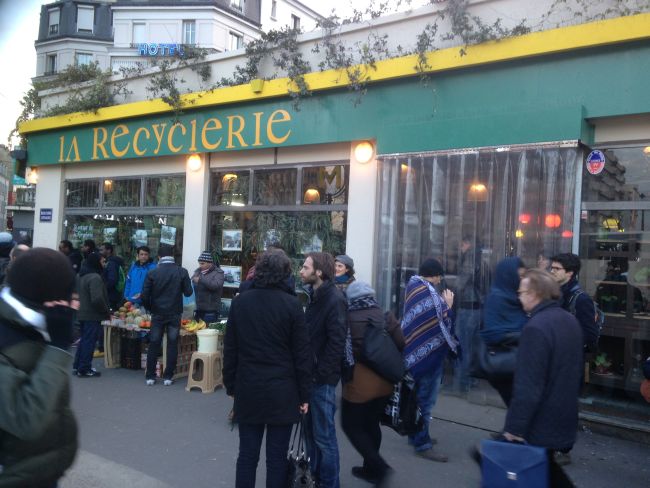
At the heart of La Recyclerie is the cafe/bar, which provides drinks and also meals made with (where possible) local ingredients. Nothing too exceptional there, but it’s what the cafe then goes on to subsidise that is really fascinating. I was taken on a tour around the Ferme Urbaine (Urban Farm), which has been created in a long railway cutting out the back of the building. All of the cafe’s waste food is composted in a series of compost bins, and the garden’s raised beds are built and fertilised using that compost. There are also experiments in hydroponics which they plan to expand soon, rearing fish for use in the restaurant.
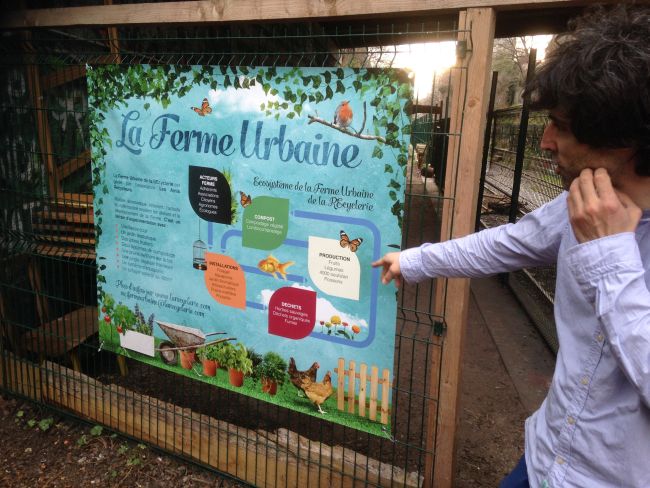
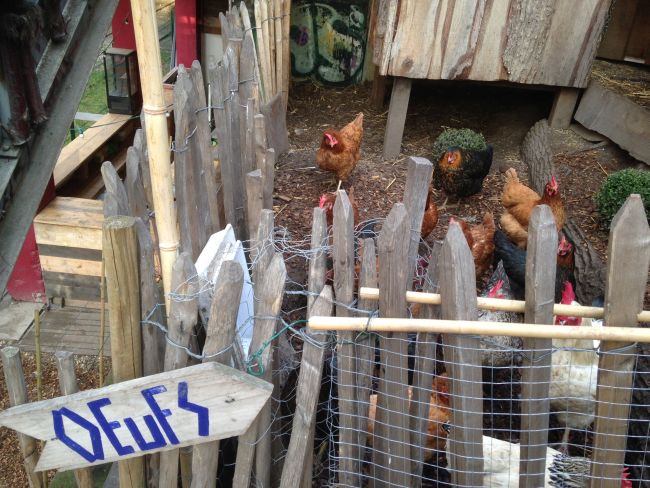
The garden is maintained by lots of volunteers who gather once a week to work on it. It features an aromatic plant garden and fruit trees and bushes on terraces cut into the slope, 20 chickens and two ducks, a 400m2 vegetable garden (which given the shape of the site is very long and narrow). Everything in the place, from the tables and chairs in the cafe, to the chickenhouse and outdoor planters, is recycled. It was all very impressive.
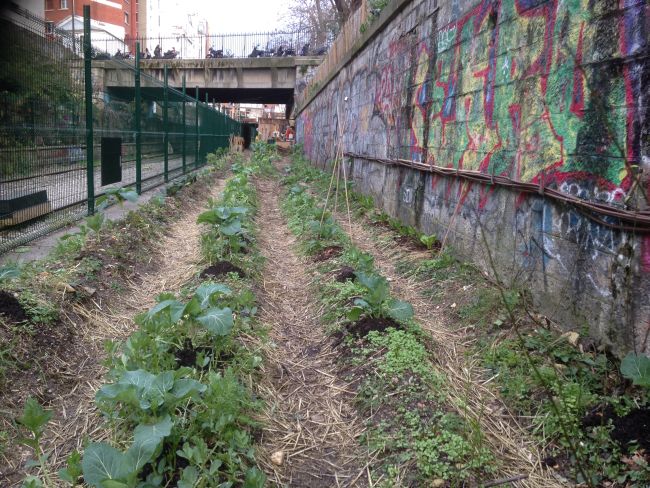
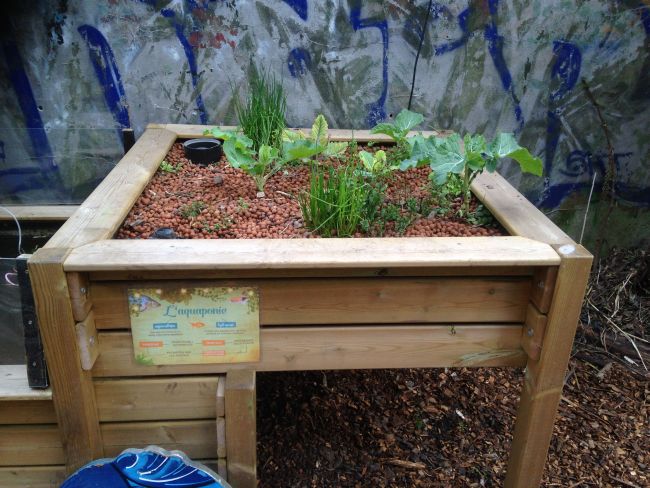
One of their experiments is into the impacts of compost on soils that were previously polluted. Being alongside the railway line, the soils included traces of lead and arsenic among other things, and so their work has included regular testing to see the impacts of adding large amounts of compost to the soils. To nobody’s particular surprise, levels are falling sharply.
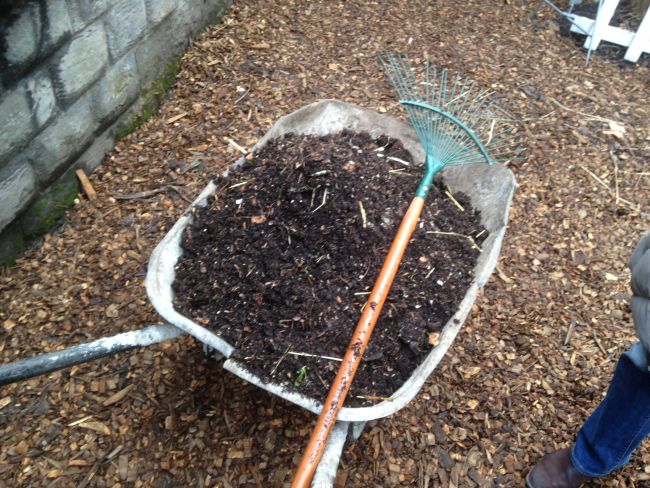
We were shown the living roof, not accessible to the public, but of which the Recyclerie team are very proud. The roof had a good depth of soil added to it and was then planted up with 50 varieties that are good for bees. Future plans include adding beehives to the roof. They were also experimenting there with growing mushrooms on their waste coffee grounds. It was quite something to be standing, looking out over one of the busiest parts of Paris, standing amid a bee garden. I imagine in the summer it’s pretty spectacular.
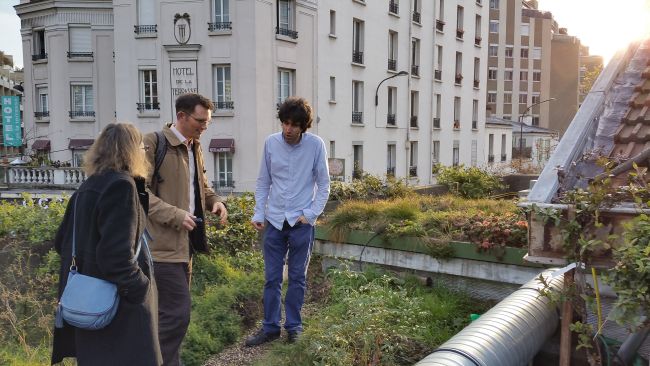
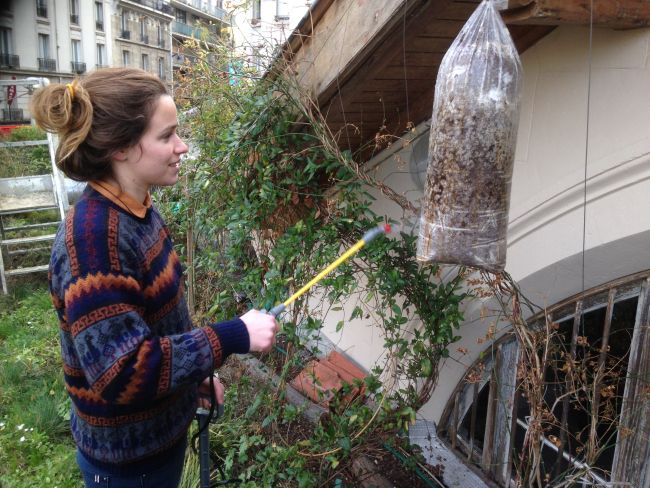
Back inside the main building, the main space is dominated by a large illuminated sign, a “light poem”, by UK post-situationist artist Robert Montgomery (apparently, according to the article I found online about it), originally exhibited in Berlin, which reads:
“The city is wilder than you think, and kinder than you think. It is a valley and you are a horse in it. It is a house and you are a child in it, safe and warm here in the fire of each other”.
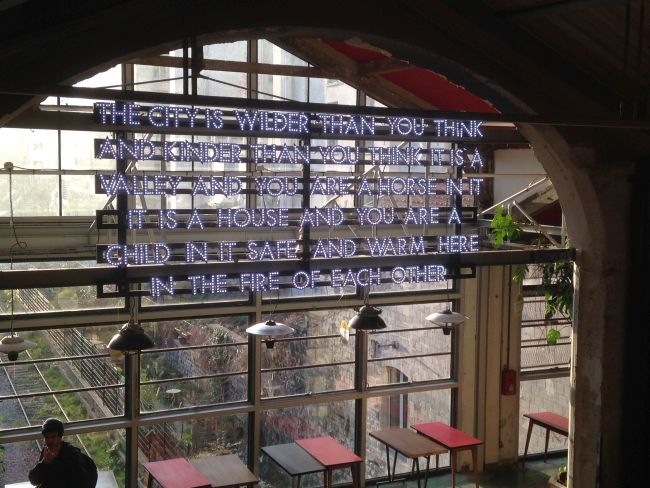
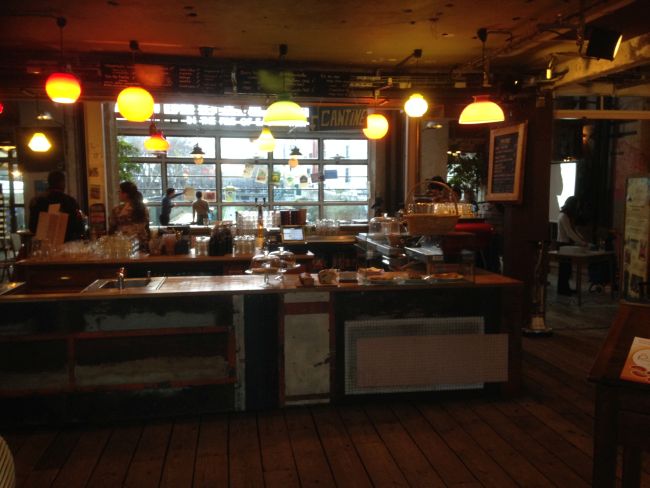
There was also the Atelier Kene, a permanent Repair Cafe in the heart of the building, with a Tool Library and all manner of reskilling workshops taking place throughout the week, and people dropping in to work on a variety of projects. Painted on one window in the main room was a painted map of Europe, which included a slightly alarming portrait, apparently, of me in the part meant to represent the UK (!).
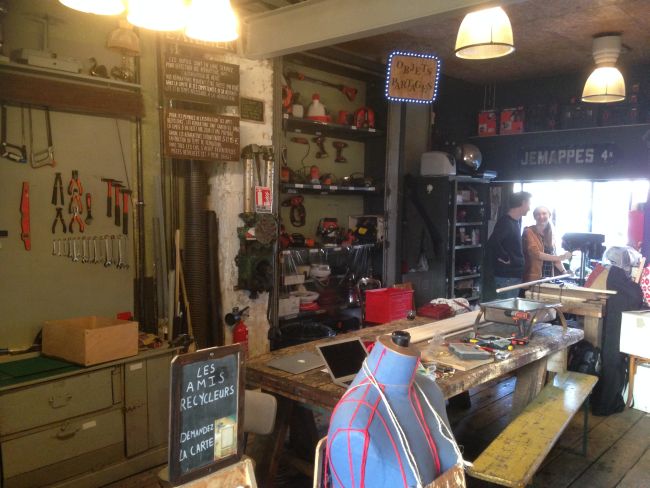
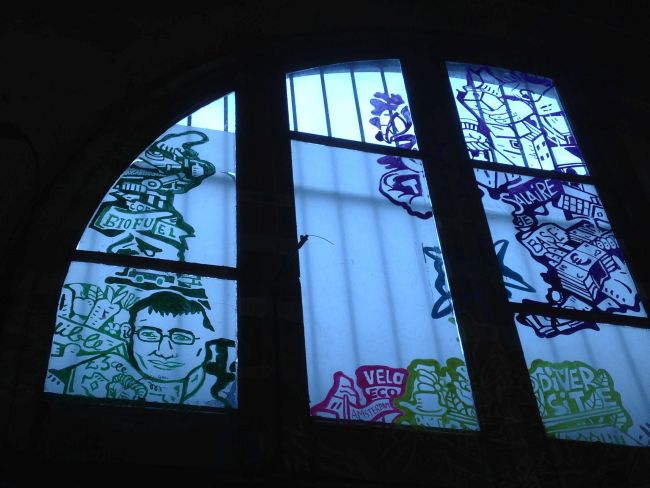
The hall was packed, and the talk went great. I told some of the 21 Stories of Transition, got people into groups discussing the threads they could see in the stories, and then heard their reflections, all ably translated by Corinne from Transition Paris. If the comments on Twitter afterwards were anything to go by, the talk went down very well.
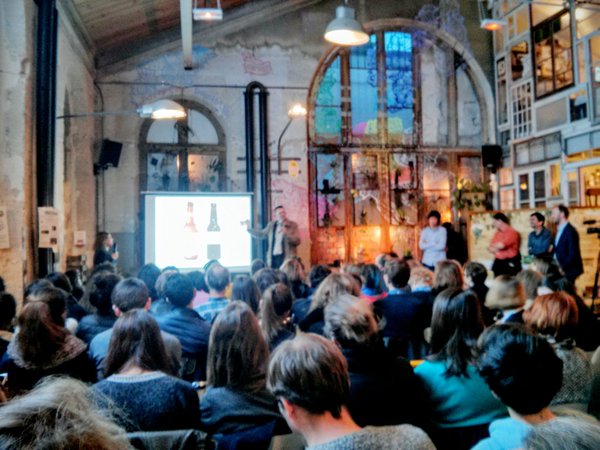
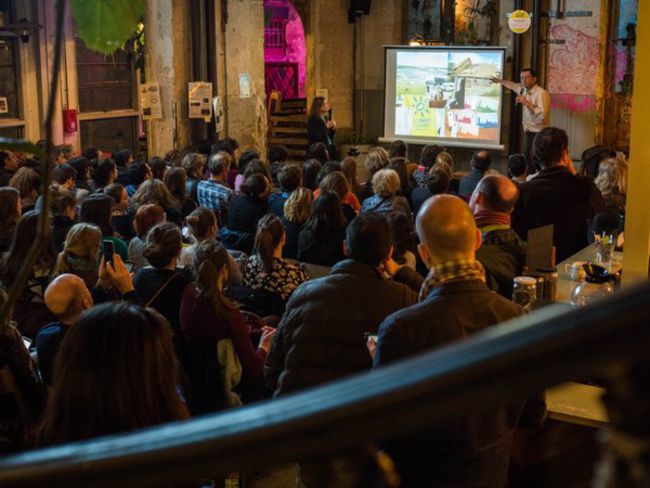
Then Corinne talked about Transition in France and how people could get involved. After some Q&A time, there was lots of book signings, selfies and chatting to people. Met lots of lovely people and had some great conversations. Once that had all calmed down, I could sit with various French Transitioners to eat, talk, and sample some of Paris’ interesting craft beers (I had a white wheat beer with chai, which was so-so) before heading off out into the night.
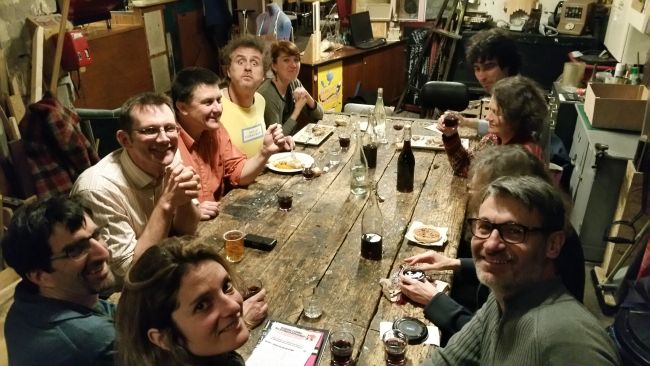
My thanks to everyone at La Recyclerie for their hospitality and for the tour of their great project, and to Up Cafe for the invitation, and to all the French Transitioners for their welcome, hospitality and kindness.
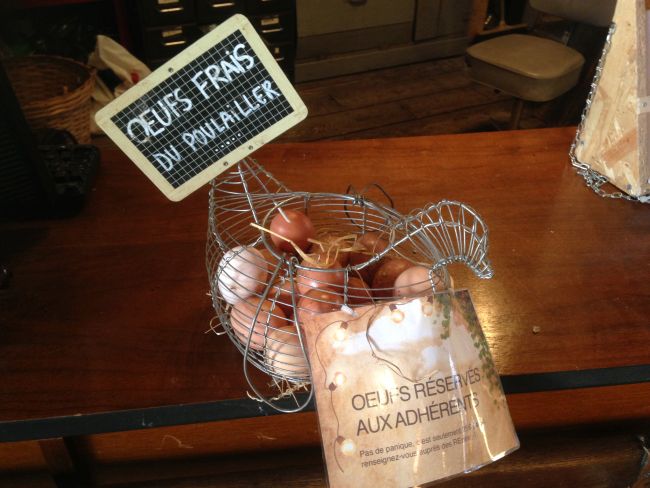
Read more»
29 Feb 2016
In her framing editorial for our theme of burnout and balance, Sophy Banks asked:
“What should leaders in our groups and our movement be modelling to show that well being and balance are more important than always doing? To model that it’s not acceptable to override one’s health to give a bit more, again and again? To give value to downtime, social time, listening, stillness, caring in our relationships, honouring and celebrating what really matters in our lives”.
So, in the same spirit that George Monbiot publishes his ‘Registry of Interests’ showing who pays him to do what, I am going to attempt an honest evaluation, rising to Sophy’s challenge, of how, as one of the ‘leaders’ of this movement, I manage balance and burnout in my own life. Feels like a useful thing to do as our burn out theme draws to a close. It is hopefully something I will do on a regular basis, and something, whatever your role in Transition, that I invite you to have a go at too. Ideally you would do this in pairs with someone else, as it’d be useful to get their insights and feedback, but I’ve just given this a stab on my own.
Drawing on on Sophy Bank’s model of what needs balancing, Claire Milne (new Inner Transition co-ordinator) and I have formulated 8 measures, 8 areas where we are trying to achieve balance. I did try to do a score for each one, but found it really difficult to score these in a way that made sense. So how am I ‘doing’?
1. Doing: Being
[By ‘Doing’ we refer to work, fast-paced, mission-related activity, and by ‘Being’ to slowing down, resting, meditating and other nourishing practices, reflecting].
I am probably not very good at this, certainly not as good as I used to be. Having a family, when I am not ‘doing’ Transition, I am ‘doing’ being a Dad and playing my part in running a household. Generally time when I would be meditating, I am too tired to keep my eyes open.
 For me, my ‘being’ time takes the form of walks on Dartmoor (about once a fortnight, see right), riding my bicycle (most days, but just into town and back), working in my garden, listening to football on the radio (oddly meditative), listening to new music (might I recommend Max Richter’s recent piece ‘Sleep’ as some extremely fine ‘Being’ music), time just hanging out with family, the rare occasions I get to do any sketching, or rare trips away with Emma (my wife). I do also try to go swimming most lunchtimes, not something I always manage, but it is my conscious effort to try to keep in some kind of shape and to make the space for that.
For me, my ‘being’ time takes the form of walks on Dartmoor (about once a fortnight, see right), riding my bicycle (most days, but just into town and back), working in my garden, listening to football on the radio (oddly meditative), listening to new music (might I recommend Max Richter’s recent piece ‘Sleep’ as some extremely fine ‘Being’ music), time just hanging out with family, the rare occasions I get to do any sketching, or rare trips away with Emma (my wife). I do also try to go swimming most lunchtimes, not something I always manage, but it is my conscious effort to try to keep in some kind of shape and to make the space for that.
However, I do think I am quite good at ringfencing my family time: I try to be home no later than 5.30 every work day, and try very hard to not work on weekends. I also try to model this for the organisation by deliberately taking all of August off work, and switching everything off. I think that would put my score up a little had I figured out a way to score these…
But striving for balance between being and doing isn’t just something that happens at home. In the context of my work, I am fortunate enough to work in an organisation that values being, that has bi-monthly ‘Being’ meetings, and in which speaking about feelings of overwhelm and stretch is welcomed. At times when I have felt overwhelmed, I have also felt overwhelming support. When I visit Transition groups to speak, I always speak up for finding a balance, as a group and as individuals, between doing and being.
One of our Being/Doing activities at work that I rather enjoy is having a Caption Competition in the office loo … a suitably daft photo of one of us that invites peoples’s comments. For me, it adds a quality of playfulness to our working culture that is really precious.
2. Thinking: Feeling
[By ‘Thinking’ we mean generating meaning and knowing through mind, body and rational, logical thought and by ‘Feeling’, generating meaning and knowing through intuition, embodied (in our body) feelings and dreams]
I think it is fair to say that I am more rooted in ‘thinking’, and I do hold to the sense that ideas and thoughts need to be rooted in evidence and research, leaning me more towards ‘Thinking’. However, I do feel like I put a lot of feeling into my writing, speaking honestly and personally, and reflecting a lot on how things impact me personally, something that is also a key element of when I give talks. I have even been known to write blogs about dreams I had.
3. Giving: Receiving
[By ‘Giving’, we mean giving our time, energy, money, commitment, attention, and by ‘Receiving’, we mean accepting appreciation, connection, warmth, money, (self) care].
I’m probably not that great at this, if I’m honest. I am definitely better at giving than receiving. I tend to deflect appreciation onto other people, out of concern at appearing big-headed or ego-driven. I am good at accepting warmth from people, at least that’s the feedback I get, but the fact that I have, after 10 years of doing Transition, not really managed to save any money during that time suggests that perhaps accepting money is something I have some kind of a block around (!). I do think I am good at giving time, energy and attention, albeit in the context of the boundaries around family life as described in 1. above.
4. Talking: Listening
[By ‘Talking’ we mean taking space, sharing our ideas, opinions and feelings, and by ‘Listening’, we mean leaving space to listen to other people’s ideas, opinions and feelings]
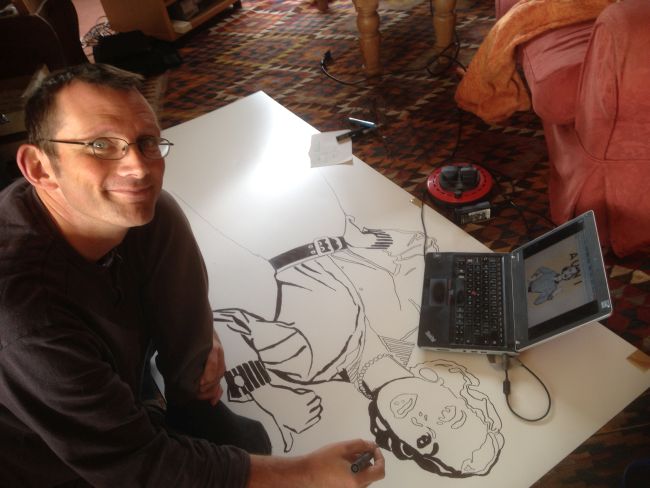
I would like to think I am a good listener, and am very open to hearing and working with other people’s ideas and thoughts. That is a culture that runs through Transition Network and how we work, and through most of the other projects I am involved in. It is also something I try to bring to projects I am part of outside of Transition. I would like to think that I am alert and attentive to other peoples’ feelings about things, although I’m not always perfect at it.
Feedback I get from places I go to visit is quite often that they felt I listened well and that they felt heard. When needed, I can take space, share my ideas, but I do try, within that, to be attentive to where those listening are at and how they are receiving what I’m saying.
5. Positivity and strength: Vulnerability
[By ‘Positivity and strength’ we mean feeling solid and optimistic, and by ‘Vulnerability’ we mean allowing ourselves/re-learning how to feel a sense of ‘not knowing’, despair, helplessness and fear].
Sometimes people imagine that, given the nature of what I do, I am somehow relentlessly upbeat and positive, but that’s not the case. Like anyone reading about what’s happening in the world (and receiving Peter Lipman’s ‘Email List of Doom’), I have down days, and moments of overwhelm. But they are surprisingly few and far between. No idea why. Just as my brother-in-law is capable of drinking amounts of beer that would put me under that table several times over without even appearing intoxicated, I seem to be able to digest that stuff and transmute it into doing things.
But life generally can be very overwhelming sometimes. There have been times, which I have written about elsewhere, when coming under attack can be very stressful and exhausting. Or when family pressures and demands, combined with work life, and an overcommitment to too many things, can leave me feeling stretch taught like the skin on a drum. Or when I feel like the work I’m doing isn’t sufficiently challenging or stretching, or like I’m just treading water. At such moments, I have good people to talk to, and TTT’s Mentoring Project, both of which have proved extremely helpful.
So for me, despair isn’t somewhere I go very often.. that could either be because I am somehow in denial, or because I am unusually able to transmute it into something else, I can’t be quite sure, so if I had figured out a way to score this, it would either be a high mark, or quite a low one…
6. Time alone: time with others
[By ‘Time alone’ we mean time spent digesting, resting, nourishing, self care and expressing our boundaries, and by ‘Time with others’ we mean relating and engaging].
I don’t get much time alone, in fact virtually none. What free time I have when I’m not working or away meeting Transition groups I spend with my kids or with Emma. My time alone is time walking the dog, riding my bicycle or swimming. I accept that while I still have kids at home that’s just how it is, they need me more than I need me. I notice that sometime when I am away, such as when I was in Paris for COP21, I give myself entirely to ‘Time with Others’, which over a period of time can be deeply exhausting, so ensuring that ‘Time alone’ is valued and designed into itineraries for trips is a key strategy moving forward. Not a great deal of balance in my life around this one.
7. Screen time/indoors; creativity/in nature
I’m not very good at this one either. I tend to check my phone first thing when I wake up, just to check that while I was asleep nothing utterly disastrous happened in the world (not that there’s much I could about it anyway between then and breakfast…). A screen is often the last thing I see before I fall asleep, and is usually a key part of the time in between too.
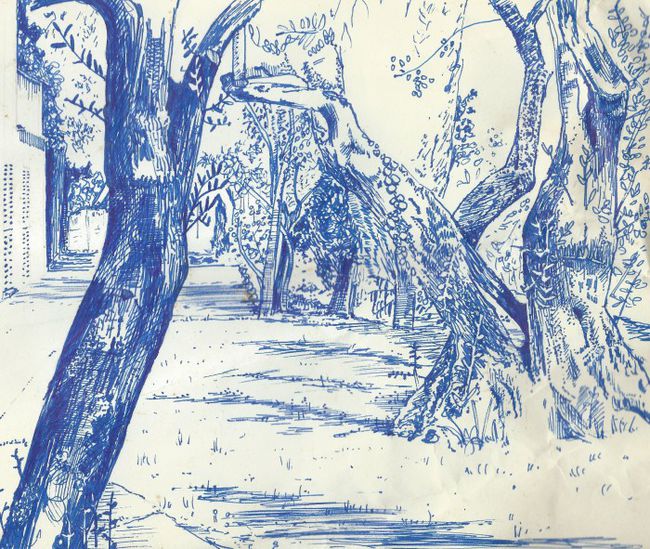
I do try though to keep to a strict rule of not working at home once I’m home, and to put my computer away during the weekends, because that time belongs to my family. During August, I aim to take the whole month off, and generally manage to put both my laptop and my mobile away for the full 4 weeks. It is wonderful. I do seek regular time in nature. I would score myself higher on this, but I am aware that my smartphone catches my attention more than it really should, and I need to get better at ignoring it.
8. Self-directed action/ Collaboration
[By ‘Self-directed action’ we mean individualistic expression, protected from group and power dynamics, hero culture, power over etc, and by ‘Collaboration’ we mean working with others collaboratively, observing and engaging with group dynamics].
This is a tricky balance for me. I am, by nature, a self-starter, a do-er, someone who likes to just go for things under my own steam. I am also an artist, and for me, my work is very similar to an arts practice, my blog is my sketchbook and so on, so I have that driven need to create. I think that I used to have more of a bull-in-a-china-shop approach of just getting on with stuff which impacted on those around me.
But my 10 years of being part of Transition Network, with the remarkable team of people I work, and have worked with, has taken me on a real journey into collaboration, and learning many of the skills needed to make it work. I think, in spite of my profile, that I am quite good at undermining any “hero culture” that arises around me, or perhaps just quite good at ignoring it. I would like to think that I am a good team player.
****
Of course, people who know me may entirely disagree with what I have written above, and feel I am deeply deluded and in huge denial. That may be so, and doing this in discussion with others would have helped. My relationship to burnout has been, until recently, a fairly regular one. Once every three -four years I tend to get some kind of bug that flattens me for about 3 weeks. Hasn’t happened for a while though, so perhaps I’m developing a new pattern? Let’s hope so. Perhaps some of the changes I’ve made, outlined above, have contributed to that. What would your Burnout Audit look like?
Read more»
26 Feb 2016
The word ‘fulfilment’ has two distinct meanings. The first, according to the Cambridge Dictionary, is “the fact of doing something that is necessary or something that someone has wanted or promised to do”, and the second “a feeling of pleasure because you are getting what you want from life”. I like the idea of the second one, a life of fulfilment, it’s something we all aspire to, right? You might even argue that we long for fulfilment: at the very least it’s certainly what one might call a Good Thing.
Yet sadly, for many, the term ‘Fulfilment Centre’ doesn’t refer to somewhere with great cake where pleasure and “getting what we want from life” are available on demand, but rather to vast, disorientating, highly stressful working environments designed not to benefit local people or the local economy, but rather distant investors and shareholders, offering the allure of cheap stuff, much of which will end up in landfill within a few months.
The Guardian reported last week that there is great concern in the villages of Sevington and Mersham in Kent that a huge new development being planned on their doorstep is in fact going to be a vast Amazon ‘Fulfilment Centre’ (although Amazon deny this). The new development, which necessitates a new junction onto the M20, will receive £50 million in government funding, including £20 million from the Local Enterprise Partnership (LEP) (more of them in later posts). There is much uproar locally, with one councillor describing Amazon as practicing “the worst kind of corporate citizenship”. I would like to also accuse them of abuse of our fine language.
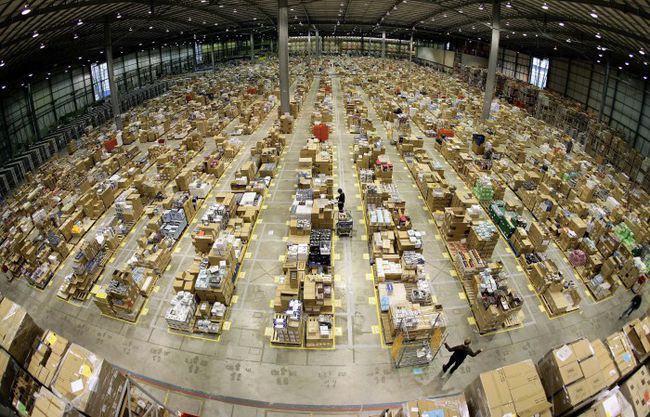
As regular readers here will be aware, when left to determine their own futures, local town economies, neighbourhood economies in urban areas, can be ‘fulfilment centres’ in the good meaning of the word, meeting their needs in the round, while doing so with virtually no public funding, and paying their taxes. For example, here in Totnes, a rare High Street where 80% of businesses are still independent businesses, I see a lot of fulfilment. I also see it in many other places, in vibrant, diverse, delicious, entrepreneurial high streets, in craft breweries, bakeries, food markets and much much more. As Julian Dobson wrote in ‘How to Save High Streets’:
“The best future for our town centres is not merely as places to buy, but as places to be; places where we can live and act as citizens rather than as consumers. Then they can be places where we rediscover local identity and community, where we can be more fully alive and more fully ourselves. As many a shopkeeper has said, why settle for less?”.
This reclaimed interpretation of the term ‘fulfilment centre’ offers a model of business with a deep sense of finding the right size, of working for a greater purpose, intimately connected to the idea of being a force for the reimagining and rebuilding of the local economy, for nurturing fulfilment, the exact opposite of what the taxpayer is subsidising to an eyewatering degree in Kent. If we get it right, we can create a model that also benefits public health, brings assets into community ownership, builds local resilience. Sounds pretty fulfilling to me.
In our Kentish ‘fulfilment centre’, the government would be gifting £50m of tax payers’ money to a company who raked in £5.3bn sales from online British shoppers last year, yet recorded a profit of just £34.4m and paid just £11.9m in tax. It is a model where that company then goes on to create poorly-paid jobs which make workers mentally and physically ill, and puts out of business the very small and medium sized enterprises that actually give that local economy its resilience and, yes, its fulfilment.
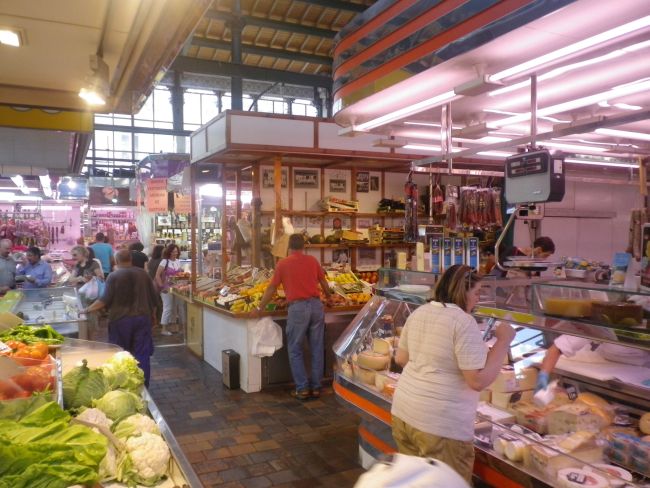
Alongside ‘fulfilment’, there are two other words that I think we need to wrestle back from the Amazons of this world:
- ‘Shift’ need not be a 14 hour, soul-destroying session in an artificially-lit warehouse order picking Jeffrey Archer novels and iPods, shift can also refer to “transfer from one position to another”, to see the world around us shifting, changing for the better.
- ‘Agency’: while agency can refer to the private company through whom people find the kind of work offered in our Amazon ‘fulfilment centre’, it can also refer to refer to “the subjective awareness that one is initiating, executing and controlling one’s own volition in the world”, in other words, that we can influence and affect the world around us.
What we try to do in the Transition movement, and in a huge array of emergent new economy movements and enterprises, is to support people to reconnect to their longing, to support them to shift, and to find their agency, and, as a result, as sense of fulfilment. Would £50m of public money poured into Amazon enable any of those things to happen? No. Quite the opposite.
We need to reclaim our local economies, and to challenge, as the wonderful Fair Tax Town movement is doing, a tax system that undermines resilient local economies and rewards predatory extractive industries like Amazon. But we also need to reclaim our language.
Read more»
19 Feb 2016
I watched the recent BBC documentary on Kids Company, Camila’s Kids Company: the inside story, with great sadness. It told the story of Camila Batmanghelidjh and the unravelling of one of the UK’s best known charities, who did remarkable work helping some of the most disadvantaged kids in the UK. While what happened is clearly complex, and while its demise leaves many vulnerable people in very precarious situations, the programme also left the viewer with a sense that charismatic, maverick people are bound to lead to trouble, and I found that deeply unsettling.
In the last World Cup, Holland played Costa Rica in one of the semi-finals. The Dutch goalkeeper, Jasper Cillessen , had played a cracking match, but in the last minute of extra time, with a penalty shootout almost a certainty, then-Holland manager Louis van Gaal substituted Cillessen for Tim Krul, a keeper with a worse goalkeeping record. In the end, the match went to penalties, Krul pulled off a series of great saves, and Holland won the match. What could have so spectacularly backfired ended with van Gaal being celebrated as a tactic genius, a “master, maverick and madman“.
Batmanghelidjh emerged from the documentary as a much loved, deeply motivated, compassionate woman who had got out of her depth, Kids Company becoming too big and complex. What worked so well in a small organisation, her unconventional approach, her spontaneous, big-hearted, ability to be flexible and responsive enabled her to work in ways that larger, more cumbersome, bureaucratic organisations couldn’t , increasingly became seen as a problem.
In the programme, the approaches that had made Kids Company so successful, so loved, so impactful, came under the cold light of scrutiny, as they have in the press over recent weeks. When seen under that harsh light, yes there were some questionable activities, but not many – what emerged into view was a maverick way of working, in all its imperfections.
There has never been a time in history when it’s harder to be a maverick. The Cambridge Dictionary defines a maverick as:
“a person who thinks and acts in an independent way, often behaving differently from the expected or usual way”.
But as organisations become more and more risk averse, when social media means that the condemnation of perceived mistakes can be so punishing and instant, fewer and fewer people are willing to really put themselves out there.
I guess I’m a bit of a maverick too. At least, I work in ways which, when things are going well could be seen as maverick, but in the cold harsh light of critical exposure would be seen as a bit odd. I am involved not just in Transition, but also in a brewery and in other things. I take all of August off work and even put my laptop in a drawer. When I give talks they could veer off into stories about all kinds of random things. I don’t fly. I work for an organisation that has ‘Being’ meetings and which starts all its meetings by giving everyone space to talk about how they’re doing.
We self-published a book with ‘Not available on Amazon’ on the back. I write blogs about slugs, my favourite painters and other things in a similar vein. When everything is working, that’s all (I hope) part of my maverick charm. But when it all goes wrong, those are the things used to denigrate your character and your work. But that ought never be a reason to stop doing those things.
Yes, mavericks can be flawed, and no, you probably wouldn’t want to give them the full financial run of an organisation because that’s not their strength, and of course, as an organisation builds around them they need a good Board to support them, but mavericks can make amazing things happen, and in a world where politicians are usually ‘on message’ tow-ers of party lines, I think we need mavericks more than ever before.
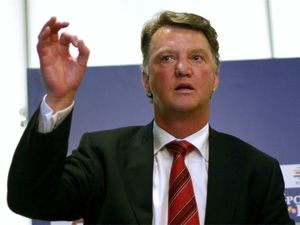 For all her faults, Batmanghelidjh was a remarkable catalyst of remarkable acts of human kindness, and she brought out the good in many people. After the riots in London she came out with the most passionate and insightful observations into what had happened. She once said:
For all her faults, Batmanghelidjh was a remarkable catalyst of remarkable acts of human kindness, and she brought out the good in many people. After the riots in London she came out with the most passionate and insightful observations into what had happened. She once said:
“Anger is waiting for someone else to do something. I tend to just become lethal, decide that something needs to be done and do it”.
This is a time where people need to step up, to show leadership, to inspire others, to start projects that many people might imagine to be impossible, to not take no for an answer. Doing so requires the ability to touch people, to inspire them, and that requires mavericks. Sadly, since that incredible World Cup semi-final, Louis van Gaal seems to have lost his maverick status, opting instead to play deeply dull football in his new role as manager of Manchester United. United supporters around the world can only dream that his inner Maverick might once more surface, take risks, be bold, playful and feisty.
If the story of Kids Company teaches us anything, let that thing be that mavericks can do amazing things, and that we should treasure them, rather than leaving us believing we must airbrush out all the risk and the edge that goes with who they are and how they work. Long live the Maverick!
Read more»


 Parent Two (the EU) isn’t perfect either. As Tim Lang and Victoria Schoen put it their excellent briefing paper on the impacts of a Brexit on the food sector, the EU “has been a bulwark against powerful forces, but it has also been subverted by them”. Parent Two spends money like it’s going out of fashion, is very hard to communicate with, and also has a serious democracy deficit.
Parent Two (the EU) isn’t perfect either. As Tim Lang and Victoria Schoen put it their excellent briefing paper on the impacts of a Brexit on the food sector, the EU “has been a bulwark against powerful forces, but it has also been subverted by them”. Parent Two spends money like it’s going out of fashion, is very hard to communicate with, and also has a serious democracy deficit.  At the heart of the problems with both of my squabbling parents is that we are being robbed of democracy at all scales: internationally; nationally; regionally and locally: as is happening in many places around the world.
At the heart of the problems with both of my squabbling parents is that we are being robbed of democracy at all scales: internationally; nationally; regionally and locally: as is happening in many places around the world. Without their influence, with no second parent to turn to, I fear deeply for Parent Two no longer having a role to play in my life, no longer being able to act as a restraining influence on Parent One. Among other things, as Lang and Schoen point out, a Brexit would lead to “unravelling 43 years of co-negotiated food legislation and exchange”.
Without their influence, with no second parent to turn to, I fear deeply for Parent Two no longer having a role to play in my life, no longer being able to act as a restraining influence on Parent One. Among other things, as Lang and Schoen point out, a Brexit would lead to “unravelling 43 years of co-negotiated food legislation and exchange”. 
















